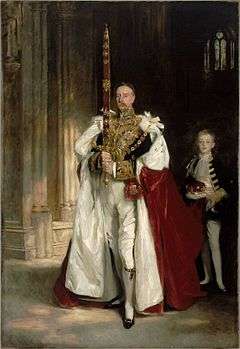Richard Middleton (political agent)
Richard William Evelyn Middleton (16 February 1846 – 26 February 1905), was an English political agent for the Conservative Party.
Early life
Middleton was the son of Alexander Middleton and Elizabeth Middleton (née Neave). He entered the Royal Navy in 1860, being promoted to navigating lieutenant in 1873. He married Emily Florence in 1877 and they had five sons and two daughters.[1]
Political agent
In 1882 he was appointed honorary secretary of a Conservative club, the Point House Club in Blackheath. The year after he became Conservative agent for the constituency of West Kent.[1]
The Corrupt Practices Act 1883, Reform Act 1884 and the Redistribution of Seats Act 1885 had greatly affected the electoral make-up of the country and Middleton's success in mastering them ensured that he was appointed the Conservatives' principal agent and command of Conservative Central Office, succeeding George Trout Bartley.[1]
Middleton openly admitted the political benefits for the Conservatives when the Liberals adopted unpopular policies; he said he was "grateful" when Gladstone adopted Irish Home Rule; grateful again when Gladstone adopted the Newcastle Programme in 1891 and "deeply grateful" when the Liberals attacked the House of Lords and adopted the local veto on liquor licences.[1]
Legacy

The historian Richard Shannon assessed Middleton's contribution to the Conservatives:
He was an organizational technician of high competence with healthily modest notions of what central party organization of itself could achieve in shaping the course of elections...It was Middleton's skill as an electioneering manager to optimize the prevailing benefits available to the Conservative Party in the epoch of unionism, empire, and what was widely deplored as the ‘age of plutocracy’. Of businesslike habits, energetic yet tactful in his dealings with the constituencies, urbane in his relationship with both superiors and subordinates, he was well prepared by his naval background to navigate the shoals and shallows and currents of new and uncharted political seas...Middleton's managerial expertise reflected the emerging characteristics of the new age of ‘mass’ politics...He shrewdly kept fences well mended with the police and the drink trade, and solicitously cultivated the ‘new journalism’ represented most famously by the Harmsworths and the Daily Mail...The reputation of Middleton and Central Office...was ‘made’ by the greater achievement in 1895 of gaining a small but telling overall Conservative majority within the Unionist coalition. Lord Londonderry hailed Middleton on behalf of the National Union as the ‘brilliant agent’, who had done ‘more than anybody else to secure the great victory we have achieved’...With the unprecedented ‘double’ of Unionist triumph in the ‘khaki’ election of 1900...Middleton's reputation attained its ultimate lustre.[1]
Notes
Further reading
- A. C. Biscoe, The Earls of Middleton and the Middleton Family (1876).
- P. Cohen, Disraeli's Child: A History of the Conservative and Unionist Party Organization (1964), Conservative Central Office Library.